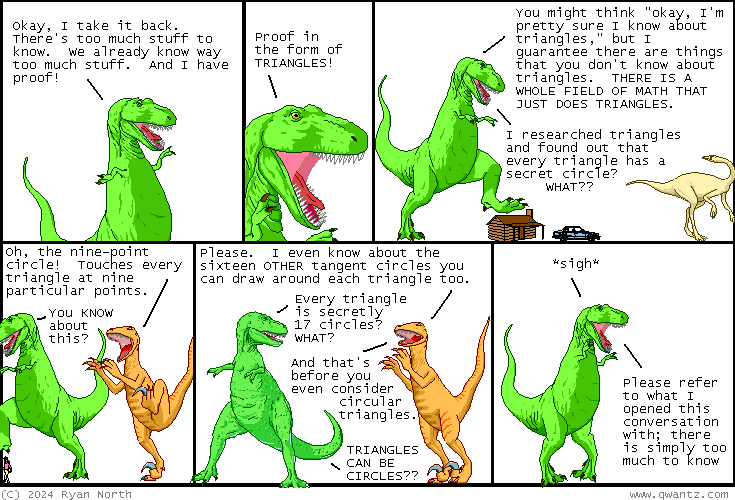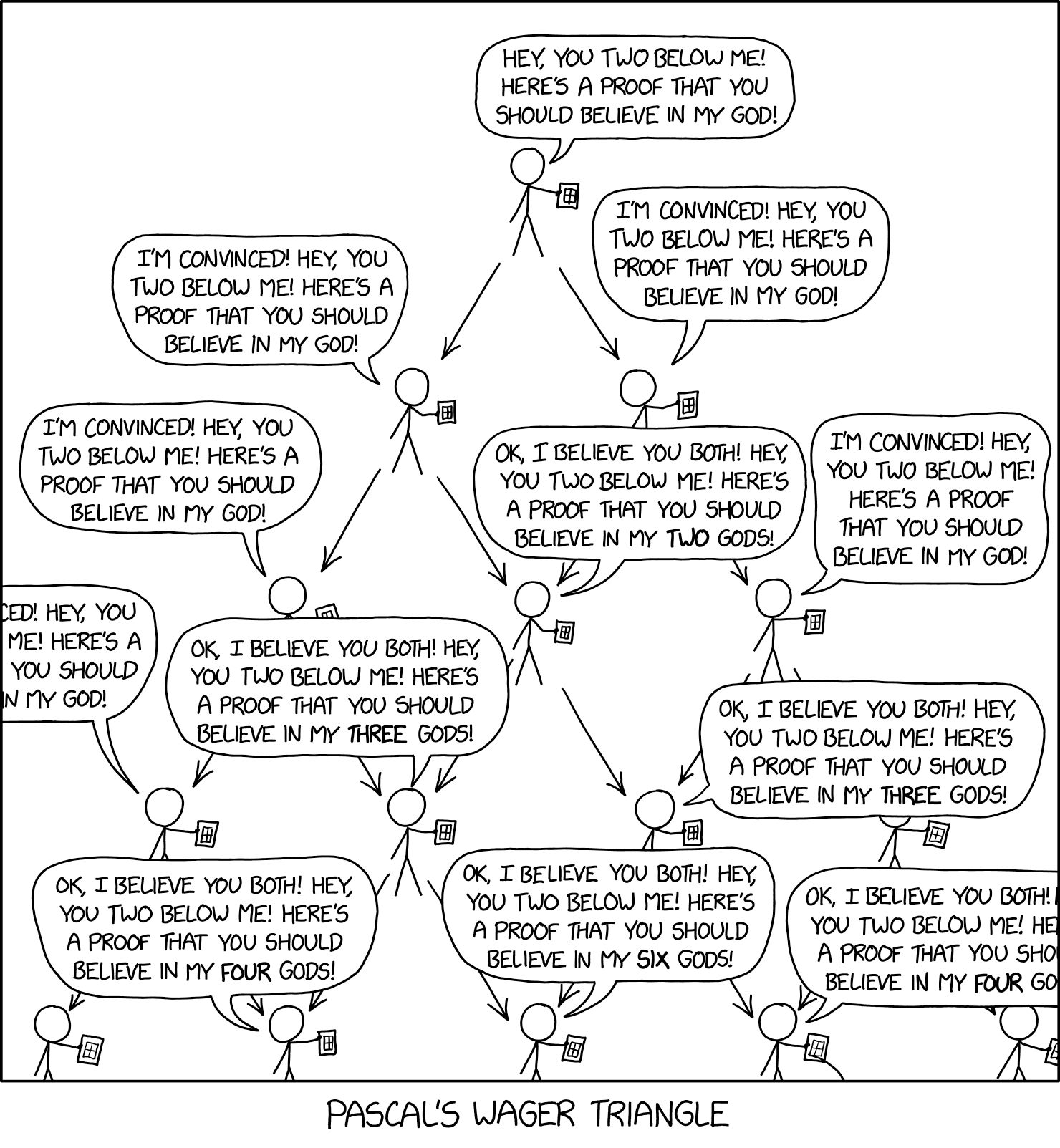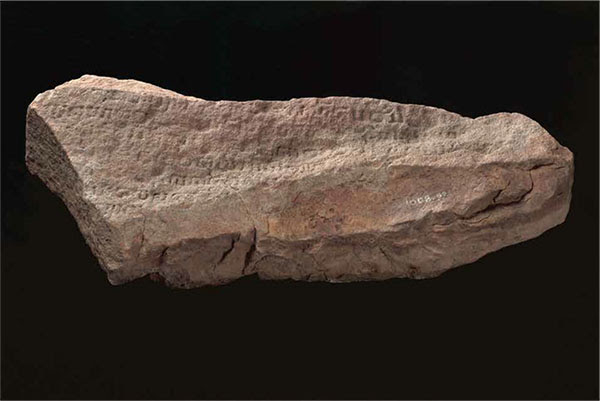Mathematical synchronicity in the comics
(…with a bit of philosophy and psychiatry in the mix…)
Dinosaur Comics for 6/17/2024:

The same day's xkcd — "Pascal's Wager Triangle":

Read the rest of this entry »
(…with a bit of philosophy and psychiatry in the mix…)
Dinosaur Comics for 6/17/2024:

The same day's xkcd — "Pascal's Wager Triangle":

Read the rest of this entry »
"Mandarin Leaves a Manhattan Courtroom Lost in Translation: Trial of Guo Wengui shows how linguistic issues can trip up China-related cases", by James T. Areddy, WSJ (6/18/24)
———
The New York trial of a Chinese businessman is Exhibit A for how language issues are gumming up federal prosecutions of Mandarin-speaking defendants.
Nearly everyone in the lower Manhattan courtroom appears frustrated by a halting process that requires translation of Chinese-language videos, documents and witness testimony.
It is one in a series of high-profile China-linked cases that are similarly getting lost in translation. Chinese-language evidence is piling up, unintelligible to attorneys. Translations are slow, and sometimes wrong. There is a limited pool of top-tier Mandarin court interpreters, and they can disagree on English translations. And for both sides in a trial, the work of interpreters provides ammunition for legal wrangling, from gamesmanship to courtroom objections and possible appeals.
Read the rest of this entry »
imgur, "On forms of address for non-binaries", by apolloendymion:
Read the rest of this entry »
Sino-Platonic Papers is pleased to announce the publication of its three-hundred-and-forty-ninth issue — Benjamin Porteous, "Reading Genesis 22 and Analects 18 in Late Antiquity":
ABSTRACT: This paper compares modes of scriptural interpretation from two ends of the Eurasian landmass in the late antique period (400–600 CE). Juxtaposing midrashim on Genesis with the Lunyi yishu 論語義疏, a famous expository commentary on the Confucian Analects, the paper argues that the difference between late-antique Confucian and Jewish commentarial practice lies in differing senses of responsibility for the sacred text. The Lunyu yishu curates the full Analects text, while midrashim presuppose a reader who turns elsewhere for the full version of the Hebrew Bible. The paper provides full typologies of commentarial technique in the midrashim and the Lunyu yishu; this is designed to assist comparison and further understanding of the practice of medieval Chinese commentary.
Read the rest of this entry »
The LLOG post on "Frociaggine" (6/8/2024) quoted the two glosses for frocio in Wiktionary:
The "friendly, ingroup" version may be reinforced by last weekend's Il Roma Pride  — Emma Bubola, "Italians Respond to Pope’s Slur by Taking Francis to Pride", NYT 6/16/2024:
— Emma Bubola, "Italians Respond to Pope’s Slur by Taking Francis to Pride", NYT 6/16/2024:
At Saturday’s celebration in Rome, Pope Francis’ image was on cardboard cutouts adorned with flower necklaces. People came dressed as the pope, wore papal hats and said that there was never too much “gayness.”
At Rome’s Pride celebration, bare-chested men in pink angel wings danced to Abba songs, women wrapped in rainbow flags kissed, and shimmering drag queens waved from parade floats. And then there was Pope Francis.
The pontiff’s image was everywhere. On cardboard cutouts adorned with flower necklaces, on glittery banners, on stickers. Romans came to the Pride parade on Saturday dressed like Francis, wearing papal hats and T-shirts that read, “There is never too much frociaggine,” a reference to an offensive slur against gay men that the pope has been accused of using twice in recent weeks.
The slur “is the slogan of the 2024 Pride,” said Martina Lorina, 28, an actress who was holding up a banner bearing the word.
Read the rest of this entry »
Inscribed sandstone known as the "Singapore Stone", Singapore, 10th–14th century:

Collection of the National Museum of Singapore
(Source; also includes an animated photo that can be rotated 360º in any direction and enlarged or reduced to any size)
Read the rest of this entry »
"Why tackling accent bias matters at work: Wall Street banks and big City law firms among employers addressing potential discrimination" by Pilita Clark, Financial Times (7/16/24).
If the polls are to be believed, the UK parliament is going to look quite different after the July 4 general election. But there might also be a big change in the way it sounds.
The last election in 2019 produced a parliament dominated by Conservative party MPs and 69 per cent of them spoke RP, Received Pronunciation, or BBC English, the accent long deemed the most prestigious in the UK.
Among the Conservatives’ Labour party opponents, however, only 37 per cent spoke like this.
With some polls predicting a Labour landslide, the halls of Westminster could soon ring with very different sounds.
Yet one aspect of parliament will probably stay the same. If history is a guide, the new crop of MPs will still sound posher than the people who elected them, because less than 10 per cent of the British population speak RP.
Read the rest of this entry »
[Warning: graphic content. If you are squeamish about detailed descriptions of wounded, putrefying human flesh, and excruciating medical treatment without anesthesia, it would be best to avoid reading the ending portion of this post.]
I met a retired teacher here in Gothenburg, Nebraska. His name is Sydney Kite and he is 81 years old. I asked him how he got such an unusual surname, and he told me a long story about that, which I shall reduce to a few sentences.
Syd's ancestors were originally English, but to escape religious persecution for their heretical beliefs at the hands of Oliver Cromwell (1599-1658), they fled England and went to the area of Germany that we now refer to as Alsace-Lorraine. There, they underwent thorough Germanization.
Read the rest of this entry »
The use of the verb positioned in this sentence, part of an article quoted in "'Dutch roll'", puzzled some commenters:
The aircraft remained on the ground in Oakland until Jun 6th 2024, then positioned to Everett,WA (USA), ATS facilities, and is still on the ground in Everett 6 days later.
But there are general processes in English morpho-syntax that validate the sentence as published.
To start with, there are various ways to verbify nouns. In particular, it's common to turn a noun denoting a place into a verb meaning "cause something to come to be in/on/at that place" — as in position N. → position V.
There's also the question of static vs. dynamic placement, which might have suggested "was re-positioned to Everett" rather than "was positioned to Everett" — but a Google search for {"then positioned to the"} demonstrates that the dynamic interpretation of position V. is entirely normal, especially in various technical domains.
Some speculated that this sentence might have been a typo for "was positioned to Everett" — but there's the causative/inchoative alternation involved in things like
(a) The pilot moved the plane to Gate 37.
(b) The plane moved to Gate 37.
Derivational morphology is quasi-regular, so new applications of these various processes tend to become normalized in particular fields, but then surprise outsiders. Which is what seems to have happened in this case…
Read the rest of this entry »
Simon Hradecky, "Accident: Southwest B38M enroute on May 25th 2024, Dutch Roll", The Aviation Herald 6/13/2024:
A Southwest Airlines Boeing 737-8 MAX, registration N8825Q performing flight WN-746 from Phoenix,AZ to Oakland,CA (USA) with 175 passengers and 6 crew, was enroute at FL320 when the aircraft experienced Dutch Roll. The crew was able to regain control and landed the aircraft on Oakland's runway 30 about 55 minutes later. The aircraft sustained substantial structural damage.
The FAA reported: "AIRCRAFT EXPERIENCED A DUTCH ROLL, REGAINED CONTROL AND POST FLIGHT INSPECTION REVEALED DAMAGE TO THE STANDBY PCU, OAKLAND, CA." and stated the aircraft sustained substantial damage, the occurrence was rated an accident.
The aircraft remained on the ground in Oakland until Jun 6th 2024, then positioned to Everett,WA (USA), ATS facilities, and is still on the ground in Everett 6 days later.
Dutch Roll is a coupled out of phase movement of the aircraft as result of weakened directional stability (provided by the vertical tail and rudder), in which the aircraft oscillates around its vertical as well as longitudinal axis (coupled yaw and roll).
The PCU is the power control unit, an actuator controlling the (vertical) rudder.
On Jun 13th 2024 The Aviation Herald learned that two ribs, that the stand by PCU is being mounted to, were damaged as well as the mounts of the stand by actuator. A temporary repair was done in Oakland replacing the damaged PCU, the aircraft was then ferried to Everett to replace the damaged ribs.
Read the rest of this entry »
Along with concerns about hallucinations and learned bias, there's increasing evidence that generative AI systems sometimes commit what would obviously be plagiarim if a human did it. One particularly striking example is discussed in a recent article by Randall Lane, editor of Forbes Magazine: "Why Perplexity’s Cynical Theft Represents Everything That Could Go Wrong With AI", 6/11/2024:
For most of this year, two of our best journalists, Sarah Emerson and Rich Nieva, have been reporting on former Google CEO Eric Schmidt’s secretive drone project, including a June 6 story detailing the company’s ongoing testing in Silicon Valley suburb Menlo Park as well as the frontlines of Ukraine. The next day, Perplexity published its own “story,” utilizing a new tool they’ve developed that was extremely similar to Forbes’ proprietary article. Not just summarizing (lots of people do that), but with eerily similar wording, some entirely lifted fragments — and even an illustration from one of Forbes’ previous stories on Schmidt. More egregiously, the post, which looked and read like a piece of journalism, didn’t mention Forbes at all, other than a line at the bottom of every few paragraphs that mentioned “sources,” and a very small icon that looked to be the “F” from the Forbes logo – if you squinted. It also gave similar weight to a “second source” — which was just a summary of the Forbes story from another publication.
Read the rest of this entry »
After I left Omaha and headed westward on Route 30 / Lincoln Highway, I began to notice that every little town along the way with a population of around three thousand or more had a restaurant called Runza. My instinct was to pronounce that "roon-zuh", but the people around here say "run-zuh".
Because I was not familiar with them, at first I didn't pay much attention to the Runza restaurants, but then I saw a sign that said they made legendary burgers. Since I'm a burger freak, always in quest of a superior hamburger, by the time I reached Cozad — which somehow has captured my heart, for more than one reason — I decided to stop in and try one.
Read the rest of this entry »